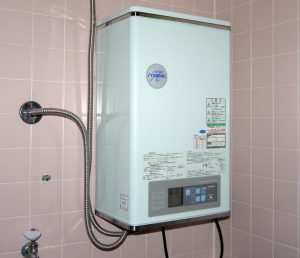 Did you notice your water heater leaking the last time you inspected it? In case you were wondering, no, this isn’t normal. After all, a small leak may seem like no big deal, but over time, the water can cause serious damage to your floors, sub-floors, and walls. Water heater leaks never go away on their own, but it’s possible for them to get worse and cause even more damage. In extreme cases, catastrophic tank failure could send water pouring out onto the floor. This is why you should address your leaking water heater as soon as possible.
Did you notice your water heater leaking the last time you inspected it? In case you were wondering, no, this isn’t normal. After all, a small leak may seem like no big deal, but over time, the water can cause serious damage to your floors, sub-floors, and walls. Water heater leaks never go away on their own, but it’s possible for them to get worse and cause even more damage. In extreme cases, catastrophic tank failure could send water pouring out onto the floor. This is why you should address your leaking water heater as soon as possible.
Why is My Water Heater Leaking?
The first step is to find the source of the leak. Remember, it’s possible that a puddle around the water heater isn’t coming from the tank at all. Instead, the furnace drain line, water softener, or other plumbing fixtures could be to blame.
The first time you notice a pool of water, mop it up and check the spot every few hours to see if the water returns. If you determine that your water heater is the source of the leak, you can troubleshoot and repair the problem to restore the tank to good working condition. Here are the three most common reasons your water heater is leaking and what to do about it.
Valve Leak
Every water heater has a temperature/pressure relief valve on the side near the top of the tank. This safety device prevents too much pressure from building up. However, the T/P valve is susceptible to leaks. If water drips or pours from the valve when it’s in the closed position, it could be defective. Hire a plumber to replace the valve and eliminate the leak.
The drain valve near the bottom of the tank can also spring a leak. If it isn’t watertight when closed completely, you should have the valve replaced.
Leaky Water Inlet and Outlet Connections
If water is spraying from the supply pipes, your first priority is to turn off the water to prevent flooding your house. To do this, check above the tank for a cold water shut-off valve. It should either feature a handle you can pull down on or a dial that you must turn clockwise to shut off the water.
If the hot water outlet connection is leaking so severely that you can’t reach the shut-off valve above the tank without touching scalding hot water, find the main shut-off valve and close this to stop the flow of water to the entire house.
With the water turned off, you can now troubleshoot and repair the problem. First, try tightening the inlet and outlet connections with a pipe wrench. If a pipe has burst or been damaged in another way, you may need a plumber to replace it.
Worn Tank Liner
If water is pooling around the tank, but you can’t see the source of the leak, it’s most likely coming from the bottom of the tank where sediment buildup has corroded the metal lining from the inside out. There is no way to repair this type of damage, which is caused by age and deterioration, so you’ll need to replace the entire water heater.

Recent Comments